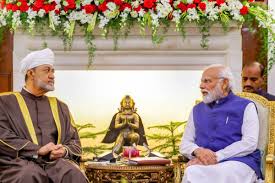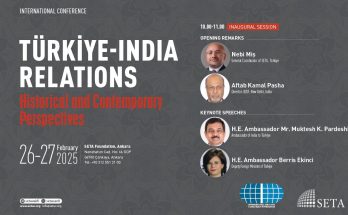
India and Oman, the oil-rich Gulf state, have transformed their multifarious relations and forged a “partnership for the future” pivoted around enhanced trade and investment and enhanced relations in areas of defence and maritime security.
The talks between Prime Minister Modi and Oman’s Sultan Haitham bin Tarik in New Delhi on December 16 culminated in a blueprint for acceleration of bilateral relations, entitled “India-Oman Joint Vision: A partnership for future.”
The vision document outlines the pathway for bilateral engagement in the coming decades and dovetails the Oman Vision 2040, a national development blueprint, and India’s development vision till 2047. The vision document encompasses 10 areas, including maritime cooperation and connectivity, energy security and green energy, cooperation in space, digital payments and fintech, partnership in health, tourism and hospitality, disaster management, agriculture and food security, and using cricket to bolster people-to-people ties.
The visit of the Oman sultan to India was watched closely in the region as it was the first trip to New Delhi by the leader of an Arab country since the outbreak of the Palestine-Israel war. This was also the first state visit by an Omani leader to India in nearly three decades.
The two sides focused on ramping up trade and investment to new heights. The two sides announced the third tranche of $300 million (about ₹2,500 crore) for the Oman-India Joint Investment Fund, a 50-50 joint venture between the State Bank of India and the Oman Investment Authority created to channel funds into the fastest growing sectors of the Indian economy.
Two-way trade between India and Oman has more than doubled from $5.4 billion in 2020-21 to $12.39 billion in 2022-23.
The challenges created by the Israel-Hamas conflict also figured in discussions between Modi and Sultan Haitham on regional and international issues. Briefing journalists, India’s Foreign Secretary Vinay Mohan Kwatra said multiple challenges thrown up by the conflict in Gaza were an “important element of the discussions”, and there was a shared appreciation of the challenges that both sides face due to the conflict and “catastrophic humanitarian situation”. The two sides also exchanged perspectives on the challenge of terrorism and the need for a two-state solution as a way forward, he said.
Author Profile
- India Writes Network (www.indiawrites.org) is an emerging think tank and a media-publishing company focused on international affairs & the India Story. Centre for Global India Insights is the research arm of India Writes Network. To subscribe to India and the World, write to editor@indiawrites.org. A venture of TGII Media Private Limited, a leading media, publishing and consultancy company, IWN has carved a niche for balanced and exhaustive reporting and analysis of international affairs. Eminent personalities, politicians, diplomats, authors, strategy gurus and news-makers have contributed to India Writes Network, as also “India and the World,” a magazine focused on global affairs.
Latest entries
 India and the WorldApril 2, 2025Mapping Next Steps for BIMSTEC
India and the WorldApril 2, 2025Mapping Next Steps for BIMSTEC India and the WorldApril 1, 2025BIMSTEC to intensify counter-terror cooperation, forge ties with ASEAN, IORA
India and the WorldApril 1, 2025BIMSTEC to intensify counter-terror cooperation, forge ties with ASEAN, IORA India and the WorldMarch 15, 2025Trump 2.0: Rewriting the Script for US-India Relations
India and the WorldMarch 15, 2025Trump 2.0: Rewriting the Script for US-India Relations India and the WorldMarch 12, 2025US-India Defence Ties Set for Upgrade
India and the WorldMarch 12, 2025US-India Defence Ties Set for Upgrade







